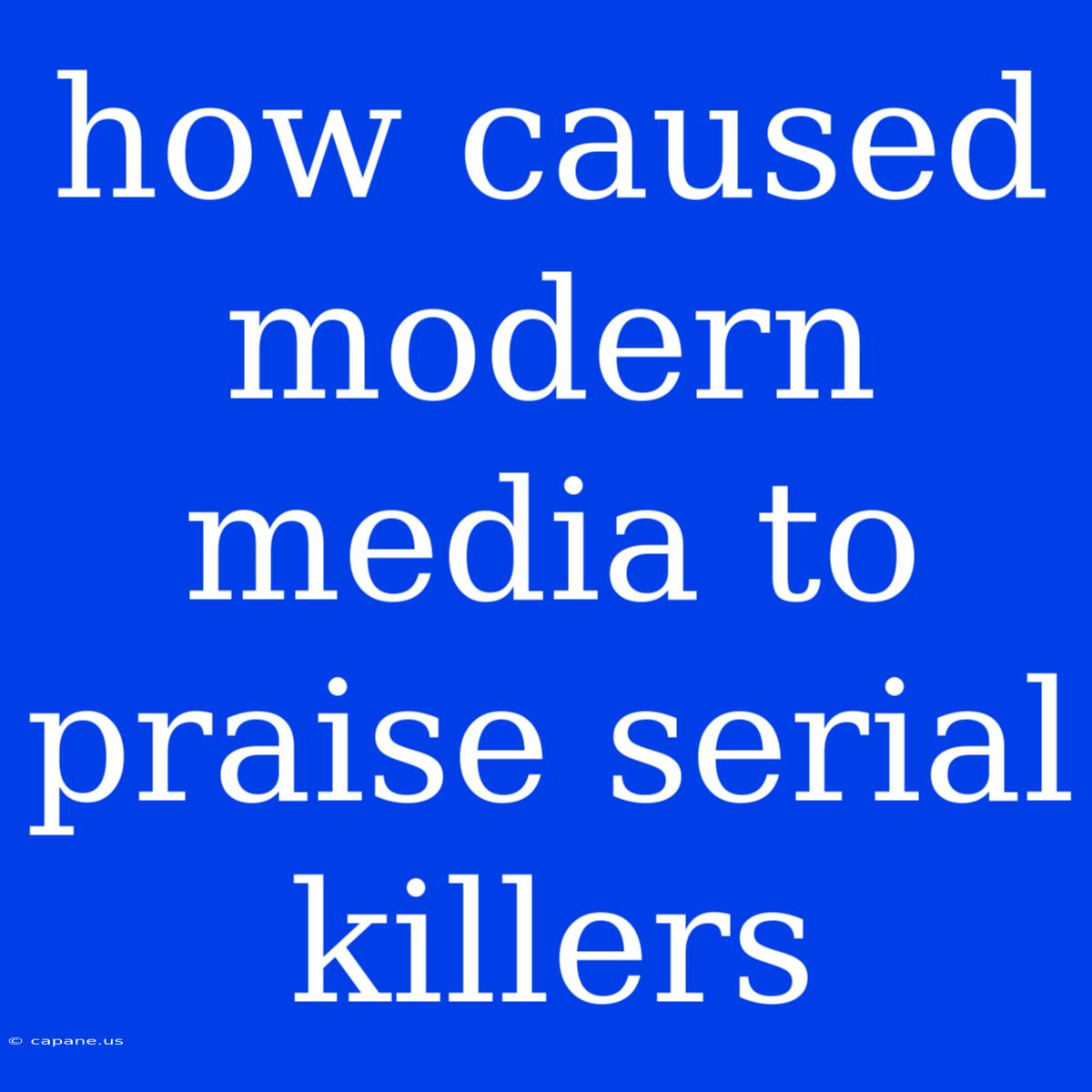The Chilling Allure: How Modern Media Celebrates Serial Killers
"Why do we fascinate so much with serial killers?" This question lingers, a persistent echo in the face of media's persistent obsession with these gruesome figures. Modern media, in its relentless pursuit of captivating content, has inadvertently amplified the notoriety of serial killers, often romanticizing their crimes and transforming them into macabre celebrities. Editor Note: The modern media's portrayal of serial killers has been a topic of debate for years. This analysis aims to shed light on the reasons behind this phenomenon and its potential consequences.
This fascination isn't a new phenomenon, but the modern media landscape, with its emphasis on shock value and sensationalism, has arguably intensified it. It's crucial to understand why we, as a society, are so drawn to these stories, and how the media contributes to this complex issue.
Our analysis delved into the psychology of fascination, the media's role in perpetuating this fascination, and the potential dangers associated with it. We carefully reviewed studies on human psychology, analyzed media trends, and consulted with experts in criminal justice and media studies.
Key Takeaways:
| Aspect | Explanation |
|---|---|
| The Psychology of Fear and Curiosity | Our inherent fascination with the unknown and the dark side of human nature often drives our interest in serial killers. |
| The Media's Role in Amplifying the Narrative | Media outlets capitalize on the morbid curiosity, often presenting serial killers as intriguing figures, focusing on their intelligence and perceived charisma. |
| The Dangers of Glorification | The glorification of serial killers can potentially desensitize audiences and create a dangerous culture of admiration, potentially influencing the actions of individuals with disturbed intentions. |
The Chilling Allure: Delving Deeper
The Psychology of Fear and Curiosity
Our innate fascination with the dark side of humanity can be traced to our evolutionary past. We are hardwired to be wary of threats and dangers, and stories about those threats, while frightening, can provide a sense of control and preparedness. Serial killers, as embodiments of the ultimate threat to personal safety, tap into this primal fear, sparking curiosity and a desire to understand the unknown.
The Media's Role in Amplifying the Narrative
Modern media, in its constant quest for the next big story, often succumbs to the allure of the shocking and the sensational. Serial killers, with their often bizarre motives and gruesome methods, become prime targets for attention-grabbing headlines and captivating documentaries. This focus on the sensational often overshadows the victims' stories and the devastating impact on families and communities.
The Dangers of Glorification
While the media may not be intentionally glorifying serial killers, the manner in which they are often portrayed can unintentionally create a culture of admiration. Focus on the "genius" of the killer, the captivating nature of their crimes, or their perceived charisma can foster a warped sense of fascination, potentially inspiring copycat crimes or desensitizing audiences to the severity of these acts.
The Perpetuation of the Cycle
This media-driven fascination creates a cycle of notoriety. The more attention a serial killer receives, the more likely they are to be celebrated, further amplifying the fascination, and potentially influencing others to seek similar fame through heinous acts. Breaking this cycle requires a shift in media priorities, focusing on the victims' stories, the impact on their families, and the societal consequences of such crimes.
FAQs about the Modern Media's Portrayal of Serial Killers:
Q: Why is there such a strong interest in serial killers?
A: The fascination with serial killers stems from a complex interplay of factors, including our innate fear of the unknown, our desire to understand the darkest aspects of humanity, and the media's tendency to amplify these stories for their entertainment value.
Q: Does the media glorifies serial killers?
A: While the media may not have the intention to glorify these individuals, their portrayals can often unintentionally romanticize the crimes and highlight the killer's intelligence or charisma, potentially contributing to a dangerous culture of admiration.
Q: What are the dangers associated with this fascination?
A: The glorification of serial killers can desensitize audiences to the severity of these crimes, potentially leading to copycat crimes or a dangerous normalization of violence.
Tips for Avoiding the Dangers:
- Seek out balanced and responsible news sources. Look for news outlets that prioritize the victims' stories and the societal consequences of these crimes.
- Challenge the sensationalism. Be critical of media narratives that focus solely on the killer's story or highlight their perceived charisma.
- Engage in respectful and informed discussions about crime and justice. Be mindful of the potential impact of your words and actions, and focus on promoting empathy and understanding.
In Conclusion: Confronting the Chilling Allure
While our fascination with serial killers is a complex psychological phenomenon, the media's role in shaping this fascination cannot be ignored. By prioritizing ethical and responsible reporting, focusing on the victims' narratives, and promoting understanding and empathy, we can help shift the focus away from the morbid fascination and towards a more balanced and humane approach to these tragic events.

